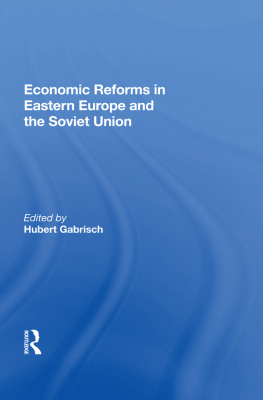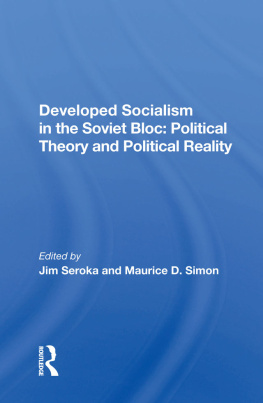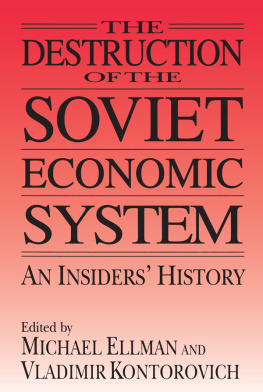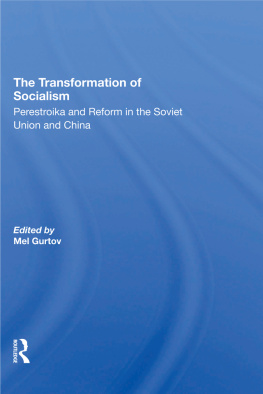Economic Reforms in Eastern Europe and the Soviet Union
Published in cooperation with
The Vienna Institute for Comparative Economic Studies
The Vienna Institute for Comparative Economic Studies Yearbook I1988
Gerhard Fink, series editor
The Vienna Institute specializes in East-West comparative economic studies and is generally considered Europes most distinguished research organization in this field. After the first yearbook, the institute plans to issue two volumes per year. This years selection surveys the most significant studies currently being conducted on reform in Eastern Europe and the Soviet Union.
Dr. Gerhard Fink is director of The Vienna Institute.
First published 1989 by Westview Press
Published 2018 by Routledge
52 Vanderbilt Avenue, New York, NY 10017
2 Park Square, Milton Park, Abingdon, Oxon OX14 4RN
Routledge is an imprint of the Taylor & Francis Group, an informa business
Copyright 1989 by Taylor & Francis
All rights reserved. No part of this book may be reprinted or reproduced or utilised in any form or by any electronic, mechanical, or other means, now known or hereafter invented, including photocopying and recording, or in any information storage or retrieval system, without permission in writing from the publishers.
Notice:
Product or corporate names may be trademarks or registered trademarks, and are used only for identification and explanation without intent to infringe.
Library of Congress Cataloging-in-Publication Data
Economic reforms in Eastern Europe and the Soviet Union/edited by
Hubert Gabrisch.
p. cm.(Westview special studies in international
economics)
ISBN 0-8133-7652-1
1. Europe, EasternEconomic policy. 2. Europe, Eastern-Economic
conditions. 3. Capital investmentsEurope, Eastern. 4. Europe,
EasternForeign economic relations. I. Gabrisch, Hubert.
II. Series.
HC244.E2436 1989
338.947dc19
88-10738
CIP
ISBN 13: 978-0-367-01271-7 (hbk)
Contents
Hubert Gabrisch
Part One
Basic Thinking About Reform
Ji Kosta
Tadeusz Kowalik
Part Two
Country Studies
Peter Havlik
Ilse Grosser
Friedrich Levcik
Michael Friedlnder
Cezary Jzefiak
Hubert Gabrisch
Part Three
Special Areas of Reform
Michael Friedlnder
Peter Havlik
Guide
This is the first yearbook of the Vienna Institute for Comparative Economic Studies, and we are greatly indebted to Westview Press for giving us the opportunity to publish it. The Vienna Institute is a non-profit research organization. Established fifteen years ago, it is mainly engaged in the study of the economies of the European members of the Council for Mutual Economic Assistance (CMEA or COMECON) and Yugoslavia and of the major issues of East-West trade.
We intend to edit a series of yearbooks treating of the most burning questions commanding attention at the given junction of time in the developments of the socialist countries and of East-West economic relations. Therefore we start with a volume on the problems of economic reform, probably the most topical subject of present discussions in the West. The individual studies first appeared in the publication series of the Vienna Institute (WIIW Forschungsberichte, Reprint Serie and Mitgliederinformationen) and are now offered to a broader public in a revised and updated form.
I would like to express my special thanks to Hubert Gabrisch for the compilation and revision of the present issue of the yearbook.
Gerhard Fink
I had the great pleasure of completing the first yearbook of the Vienna Institute, but was also assigned the difficult task of making a choice among the many papers published by the Institute in the course of the last few years. The socialist countries are faced today with many problems: structural change, hard currency shortage and indebtedness, lack of innovative progress etc. All these problems increase the pressure for economic reform, therefore I singled out papers dealing with questions of and approaches to such reforms. In my concept of the yearbook, I intend to link more theoretical papers with highly informative country and problem studies.
The manuscripts were prepared for publication by diligent translating and improvement efforts of Fred Prager (Vienna), who shares his name with Fred Praeger (publisher, Westview Press) - both bom in Vienna many years ago - and Eva Strobl.
Without Renate Garbacz who processed the manuscripts on computer and prepared the camera-ready copy, it would hardly have been possible to publish this yearbook on time and in its present quality.
I would also like to emphasize the invaluable assistance given by Karen Foster and, later, by Carolyn Richards of Westview Press, who helped me - over a distance of more than 6000 km - to bring the yearbook into shape.
To all of them my thanks are due. Yet for the yearbooks present form I am solely responsible.
Hubert Gabrisch
Hubert Gabrisch
Theme and Content of the Book
The following papers deal with the implementing stage of the recent economic reform thrusts in the socialist countries of Europe - the measures and concepts of the years 198188. These attempts were undertaken not only by countries with a long history of reform experiences, such as Hungary, or - with reservations - Poland, but also by countries whose policies have traditionally conservative and dogmatic features, such as the Soviet Union and Bulgaria. Even in Czechoslovakia the leadership that hailed the Warsaw Pact armies in 1968 to repress the reforms of the Prague Spring, gives some cautious signals of opening. Only the leaderships of GDR and Romania are unwilling to initiate reforms. What are the problems faced by the latest reform wave, and what are its characteristics - that is the main theme of this book. The authors, many of whom have for long closely followed the reform discussion, analyze the chances and limits of the reform.
The book is divided into three parts. deals with two special areas of reform: foreign trade (Peter Havlik) and the banking system (Michael Friedlnder).
Basic Thinking About Reform
Comparing the scope and dynamics of the last reform movements with all previous approaches in the 1960s, 1970s and early 1980s, a basic difference should be stressed: the support given by the Soviet leadership to the very idea of reform in other countries.
Thus the present wave resembles the first wave of economic reforms in the mid-1950s. But the middle of the 1950s was a period of recovery from Stalinist terror and cold war for East European societies, some of whom could still remember more urbane times before. It was the era of Khrushchevs destalinization - a first perestroika - and of Gomulkas Polish way to socialism. Thus T. Kowalk in his contribution remarks that the first wave of economic reforms was mainly based on moral and political, not on economic principles. It was still believed even by reformers such as Oskar Lange, that the central planning system would be able to ensure high growth rates. It took another thirty years of failures of the old system to convince party leaders that central planning of a mature and complex society ensures only one thing: being outdistanced by the Western societies.
By the end of the 1950s Polands Gomulka had thrown out the reforms promised in 1956. Khrushchev had been overthrown by Brezhnev. A long lasting period of stagnation followed (except in Hungary). This was a period of sterile debate about the transition from extensive to intensive development. When reform policies were formulated in Eastern Europe in the 1960s, 1970s and early 1980s, they were viewed by the Soviet leadership more or less mistrustfully. The latter saw their main task in the containment of reforms to the economic sphere, if necessary even by violent suppression, as in the case of the Prague Spring in 1968. The tedious phrase was the Completion and improvement of the planning mechanism, and the outcomes of these policies were disastrous: today the socialist countries are threatened by stagnation, and, even worse, there is no fond hope of either growth or reform (T. Kowalk).










